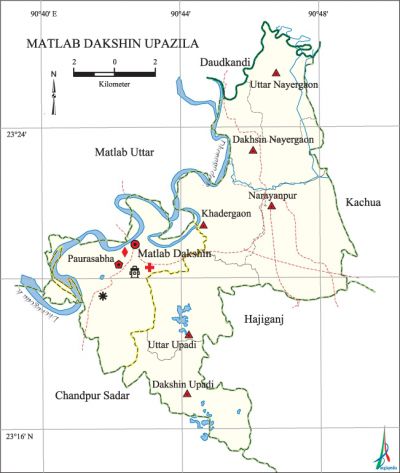Matlab Dakshin Upazila
Matlab Dakshin Upazila (chandpur district) area 129.32 sq km, located in between 23°15' and 23°26' north latitudes and in between 90°40' and 90°50' east longitudes. It is bounded by matlab uttar and daudkandi upazilas of comilla district on the north, chandpur sadar and hajiganj upazilas on the south, kachua upazila (Chandpur district) on the east and Matlab Uttar on the west.
Population Total 210050; male 97728, female 112322; Muslim 188980, Hindu 20973, Christian 40 and others 55.
Water bodies Main river: Dhonagoda.
Administration Matlab Thana, now an upazila, was formed in 1918. On 30 April 2000 Matlab upazila was divided into two such as Matlad Uttar and Matlab Dakshin upazilas.
| Upazila | ||||||||
| Municipality | Union | Mouza | Village | Population | Density (per sq km) | Literacy rate (%) | ||
| Urban | Rural | Urban | Rural | |||||
| 1 | 6 | 77 | 97 | 59286 | 150764 | 1624 | 63.0 | 54.2 |
| Municipality | ||||||||
|
Area (sq km) |
Ward |
Mahalla |
Population |
Density (per sq km) |
Literacy rate (%) | |||
| 30.92 | 9 | 31 | 59286 | 1917 | 63.0 | |||
| Union | ||||
| Name of union and GO code | Area (acre) | Population | Literacy rate (%) | |
| Male | Female | |||
| Uttar Upadi 60 | 4065 | 10626 | 13291 | 54.7 |
| Dakshi Upadi 86 | 3715 | 10096 | 12388 | 59.6 |
| Khadergaon 34 | 3455 | 9254 | 11090 | 54.0 |
| Uttar Nayergaon 56 | 3234 | 9420 | 10425 | 60.1 |
| Dakshi Nayergaon 82 | 4047 | 12666 | 13635 | 52.2 |
| Narayanpur 43 | 5801 | 17615 | 20258 | 49.2 |
Source Bangladesh Population Census 2011, Bangladesh Bureau of Statistics.

Archaeological heritage and relics Neel Kuthi at Munsifdi and Baraduara at Kashimpur.
War of Liberation Freedom fighters of the upazila had encounters with Pak army at Lalar Hatkhola, Baradia Arong Bazaar, Nagdar and other palces of the upazila. 26 Pakistani soldiers were killed in the encounter at Lalar Hatkhola. There is a sculpture has been founded in the upzila.
For details: see মতলব দক্ষিণ উপজেলা, বাংলাদেশ মুক্তিযুদ্ধ জ্ঞানকোষ (Encyclopedia of Bangladesh War of Liberation), বাংলাদেশ এশিয়াটিক সোসাইটি, ঢাকা ২০২০, খণ্ড ৭।
Religious institutions Mosque 265, temple 36. Noted religious institutions: Matlab Bazar Mosque, Narayanpur Bazar Mosque, Dhanarpar Mosque, Upadi Buddhist Math.
Literacy rate and educational institutions Average literacy 56.7%; male 56.9%, female 56.6%. Educational institutions: college 4, secondary school 28, primary school 88, madrasa 16. Noted educational institutions: Matlab Degree College (1964), Boalia High School (1917), Matlabganj JB Pilot High School, Aushinpur High School, Boaliapur Girls' High School, Narayanpur High School, Hazrat Shah Jalal High School, Payali KBM High School, Munshir Hat High School, Kachiara Girls' High School, Naogaon High School, Kashimpur Purana High School, Kalikapur High School, Lamchari High School, Bahari High School, Matlab Ideal School.
Cultural organisations Library 2, theatre group 3, cinema hall 2, club 165.
Main sources of income Agriculture 48.07%, non-agricultural labourer 2.02%, industry 0.84%, commerce 15.85%, transport and communication 2.19%, service 11.23%, construction 1.91%, religious service 0.32%, rent and remittance 3.78%' and others 13.79%.
Ownership of agricultural land Landowner 67.86%, landless 32.14%; agricultural landowner: urban 53.28% and rural 73.65%.
Main crops Paddy, wheat, potato, jute, sugarcane, mustard seeds and linseed.
Exrinct or nearly extinct crops Sesame.
Main fruits Mango, blackberry, jackfruit, guava, coconut, papaya, jamrul, amra and kamranga.
Fisheries, dairies and poultries Fishery 1940, dairy 11, poultry 16.
Communication facilities Pucca road 56.7 km, semi pucca road 56.9, mud road 56.6; waterway 10 km.
Extinct or nearly extinct traditional transport Palanquin, bullock cart.
Cottage industries Goldsmith, blacksmith, potteries, etc.
Hats, bazars and fairs Hats and bazars are 18, most noted of which are Narayanpur Hat, Nayergaon Hat, Munshir Hat, Matlabganj Bazar, Master Bazar and Arong Bazar.
Main exports Potato, jute, fish.
Access to electricity All the wards and unions of the upazila are under rural electrification net-work. However 49.5% of the dwelling households have access to electricity.
Sources of drinking water Tube-well 87.8%, tap 6.0% and others 6.2%.
Sanitation 63.6% of dwelling households of the upazila use sanitary latrines and 32.2% of dwelling households use non-sanitary latrines; 4.2% of households do not have latrine facilities.
Health centres Hospital 1, upazila health complex 1, clinic 7.
NGO activities Operationally important NGOs are brac, asa, proshika. [Masum Patwari]
References Bangladesh Population Census 2001 and 2011, Bangladesh Bureau of Statistics; Cultural survey report of Matlab Dakshin Upazila 2007.
